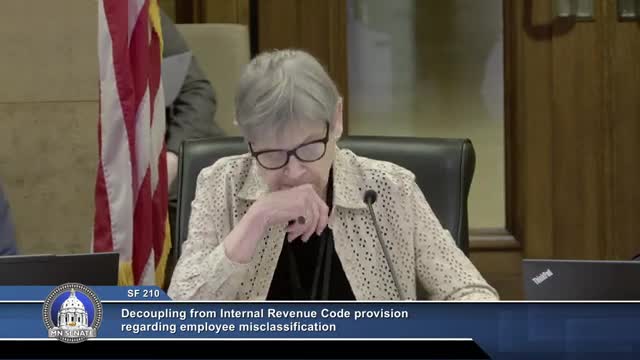Committee hears bill to deny state conformity with federal Section 530 safe harbor for worker misclassification
Get AI-powered insights, summaries, and transcripts
Subscribe
Summary
Senate File 210 would prevent Minnesota from adopting the federal safe harbor (Section 530) that can allow employers to avoid payroll tax liability after misclassification findings; the Department of Revenue supports the bill but noted operational implications.
Senate File 210, authored in the hearing by Senator Verbaten, would amend Minnesota’s income and franchise tax definition section (Minn. Stat. ch. 290.01) to decline state conformity with the federal Internal Revenue Code provision commonly referred to in testimony as Section 530. The committee heard the measure Feb. 19 and laid the bill over for omnibus consideration.
Senator Verbaten told the committee Section 530 creates a “permanent cure” for employers who have misclassified employees as independent contractors: if an employer meets the Section 530 safe-harbor conditions (including an industry-practice reasonable basis), the employer can avoid federal employment tax obligations even when an audit shows misclassification. The senator said the safe harbor “allows employers to continue to misclassify that worker for the purposes of employment tax obligations which is ultimately defrauding the government and taxpayers.”
Joanna Bares, legislative director at the Minnesota Department of Revenue, told the committee the administration supports the bill and the agencies’ work to address worker misclassification. Bares explained that Section 530 relief is a federal tax determination that, if granted by the IRS, Minnesota would grant on the state side only when the IRS has completed the audit; under the bill, Minnesota would stop reviewing the IRS Section 530 factors during a state misclassification audit but would follow an IRS determination if the IRS audited first. She described administrative complications for properly classifying workers and ensuring access to benefits when a worker is treated as a contractor on tax records.
Committee members discussed the history of Section 530 (adopted in 1979 at the federal level and incorporated into state law in 2009 through a conformity provision) and the bill’s purpose in improving the Department of Revenue’s tools to detect and deter misclassification fraud. No formal vote was taken; the committee laid Senate File 210 over for inclusion in the omnibus bill so it can be considered with related measures.
